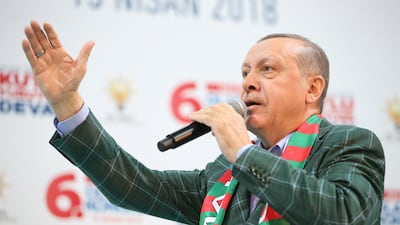When the West mulled intervention in Syria’s civil war following the Assad regime’s alleged chemical weapons attack in Ghouta back in August 2013, Turkey was among the most vocal proponents of toppling the Syrian dictator.
President Recep Tayyip Erdogan, then prime minister, called for a Kosovo-style intervention to topple President Bashar Al Assad in preference to more limited punitive strikes then being considered by Washington.
“An operation of one or two days will not be enough,” he said at the time. “The goal should be to force the regime out.”
Five years on, Ankara’s position on intervention has changed significantly. Following the most recent chemical attack in Douma, Turkey’s foreign ministry noted merely that the targeted airstrikes carried out by the US, UK and France at the weekend were an “appropriate response” to the regime’s alleged atrocity.
The shift in rhetoric reflects Ankara’s altered priorities in Syria, and the importance it attaches to its emerging partnership with Russia, the Assad regime’s chief backer, in achieving its aims.
Whereas in the early years of the conflict Turkey’s main goal was the overthrow of Assad through international intervention, it is now focused more narrowly on thwarting the emergence of a Kurdish autonomous region in the north of the country.
Turkey’s recent military takeover of Afrin, the enclave on its Syria border that had been controlled by the Syrian Democratic Forces (SDF), a Kurdish-dominated group closely linked to Kurdish separatist rebels in Turkey, was enabled through Russian acquiescence.
Meanwhile, Washington has blocked any further Turkish moves against SDF-controlled territory in the east of the country, where US and Kurdish forces are fighting together against ISIS.
“[Turkey’s] partnership with Russia has proven to be relatively effective in advancing Turkish interests in Syria—more so than its partnership with its NATO allies, including the US,” says Sinan Ulgen, chairman of the Istanbul-based the Centre for Economics and Foreign Policy Studies.
As a long time Western ally that is host to US forces, the latest strikes have put Turkey in a delicate position. While he has long styled himself a strident critic of Assad regime atrocities, with a public image as a defender of Syria’s downtrodden Sunni Muslim majority, Mr Erdogan also needs to distance himself from any Western action in order to placate Moscow.
The seeds of Turkey’s change of course were sown after that first international outcry surrounding the regime’s alleged chemical attack in Ghouta, when US President Barack Obama shied away from military intervention.
__________________
Read more:
Turkey distances itself from Iran, Russia and US on Syria
Iraq struggles to expel Kurdish militia from the north
__________________
In the absence of Western action, Russia and Iran became increasingly committed in their support of Assad, turning the tide of the conflict and eventually forcing Ankara to abandon its vision of crafting a post-Assad Syria receptive to Turkish influence.
Meanwhile, in 2015 the breakdown of peace talks between the Turkish state and the separatist Kurdistan Workers Party (PKK), led to the resumption of Turkey’s own three-decade long Kurdish insurgency, causing Ankara to harden its stance against the PKK’s Syrian affiliate which, with US air support, had seized the northeast of the country from ISIS.
Since then, Turkey has sought to strengthen its position regarding any future political settlement in Syria by seizing its own tranche of territory in two campaigns, Operation ‘Euphrates Shield’ launched against the ISIS and Kurdish groups in 2016, and Operation ‘Olive Branch’, in which it seized Afrin earlier this year.
Parallel to this, Ankara is working closely with Moscow and Tehran in an effort to bring about a political settlement to the conflict, its chief aim being to prevent any kind of Kurdish autonomy being enshrined in a future Syria.
After an inconclusive summit in the Black Sea resort of Sochi last November, Mr Erdogan and his counterparts, Russia’s President Vladimir Putin and Iran’s President Hassan Rouhani, met again on April 4th to discuss the future of Syria.
Often overlooked in this emerging partnership is Moscow and Tehran’s dependence on Ankara to use its influence to bring Sunni rebel groups in Syria to the negotiating table.
“We’ve moved past the point where we can call this transactional," says Aaron Stein, senior resident fellow at the Atlantic Council in Washington. “Erdogan and Putin talk on the phone all the time, and they need each other.
“Turkey is in control of all of Northern Aleppo and their operations happened because the Russians allowed them to. The Turks have a lot of leverage over the Russians too. They need the Turks to settle the conflict by bringing the rebel opposition to the table.”
In this context, the Trump administration's avoidance of any escalating confrontation with Russia will have been as much of a relief in Ankara as anywhere else.
However with Turkey perched ever more precariously between its long-time Western allies and its newfound partner Moscow, it will have to chart a careful course as tension between the old Cold War adversaries continues to rise.

